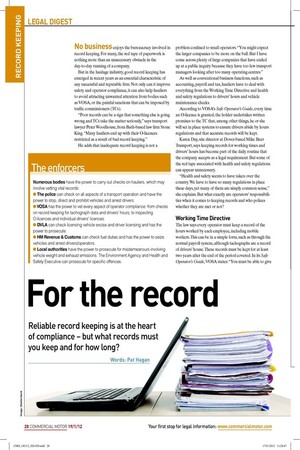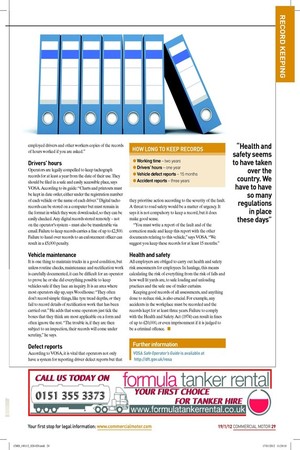For the record
Page 22

Page 23

If you've noticed an error in this article please click here to report it so we can fix it.
Reliable record keeping is at the heart of compliance – but what records must you keep and for how long?
Words: Pat Hagan
The enforcers
Numerous bodies have the power to carry out checks on hauliers, which may involve vetting vital records: • The police can check on all aspects of a transport operation and have the power to stop, direct and prohibit vehicles and arrest drivers.
• VOSA has the power to vet every aspect of operator compliance: from checks on record keeping for tachograph data and drivers’ hours, to inspecting O-licences and individual drivers’ licences.
• DVLA can check licensing vehicle excise and driver licensing and has the power to prosecute.
• HM Revenue & Customs can check fuel duties and has the power to seize vehicles and arrest drivers/operators.
• Local authorities have the power to prosecute for misdemeanours involving vehicle weight and exhaust emissions. The Environment Agency and Health and Safety Executive can prosecute for specific offences.
No business enjoys the bureaucracy involved in record keeping. For many, the red tape of paperwork is nothing more than an unnecessary obstacle in the day-to-day running of a company.
But in the haulage industry, good record keeping has emerged in recent years as an essential characteristic of any successful and reputable irm. Not only can it improve safety and operator compliance, it can also help hauliers to avoid attracting unwanted attention from bodies such as VOSA, or the painful sanctions that can be imposed by trafic commissioners (TCs).
“Poor records can be a sign that something else is going wrong and TCs take the matter seriously,” says transport lawyer Peter Woodhouse, from Bath-based law irm Stone King. “Many hauliers end up with their O-licences restricted as a result of bad record keeping.” He adds that inadequate record keeping is not a problem conined to small operators. “You might expect the larger companies to be more on the ball. But I have come across plenty of large companies that have ended up at a public inquiry because they have too few transport managers looking after too many operating centres.” As well as conventional business functions, such as accounting, payroll and tax, hauliers have to deal with everything from the Working Time Directive and health and safety regulations to drivers’ hours and vehicle maintenance checks.
According to VOSA’s Safe Operator’s Guide, every time an O-licence is granted, the holder undertakes written promises to the TC that, among other things, he or she will set in place systems to ensure drivers abide by hours regulations and that accurate records will be kept.
Karen Day, site director at Dover-based Mike Beer Transport, says keeping records for working times and drivers’ hours has become part of the daily routine that the company accepts as a legal requirement. But some of the red tape associated with health and safety regulations can appear unnecessary.
“Health and safety seems to have taken over the country. We have to have so many regulations in place these days, yet many of them are simply common sense,” she explains. But what exactly are operators’ responsibilities when it comes to keeping records and who polices whether they are met or not?
Working Time Directive
The law says every operator must keep a record of the hours worked by each employee, including mobile workers. This can be in a simple form, such as through the normal payroll system, although tachographs are a record of drivers’ house. These records must be kept for at least two years after the end of the period covered. In its Safe Operator’s Guide, VOSA states: “You must be able to give
employed drivers and other workers copies of the records of hours worked if you are asked.”
Drivers’ hours
Operators are legally compelled to keep tachograph records for at least a year from the date of their use. They should be iled in a safe and easily accessible place, says VOSA. According to its guide: “Charts and printouts must be kept in date order, either under the registration number of each vehicle or the name of each driver.” Digital tacho records can be stored on a computer but must remain in the format in which they were downloaded, so they can be easily checked. Any digital records stored remotely – not on the operator’s system – must also be transferable via email. Failure to keep records carries a ine of up to £2,500. Failure to hand over records to an enforcement oficer can result in a £5,000 penalty.
Vehicle maintenance
It is one thing to maintain trucks in a good condition, but unless routine checks, maintenance and rectiication work is carefully documented, it can be dificult for an operator to prove he or she did everything possible to keep vehicles safe if they face an inquiry. It is an area where most operators slip up, says Woodhouse: “They often don’t record simple things, like tyre tread depths, or they fail to record details of rectiication work that has been carried out.” He adds that some operators just tick the boxes that they think are most applicable on a form and often ignore the rest. “The trouble is, if they are then subject to an inspection, their records will come under �����n�������� scrutiny,” he says.
Defect reports
According to VOSA, it is vital that operators not only have a system for reporting driver defect reports but that they prioritise action according to the severity of the fault. A threat to road safety would be a matter of urgency. It says it is not compulsory to keep a record, but it does make good sense.
“You must write a report of the fault and of the correction made and keep this report with the other documents relating to this vehicle,” says VOSA. “We suggest you keep these records for at least 15 months.”
Health and safety
All employers are obliged to carry out health and safety risk assessments for employees. In haulage, this means calculating the risk of everything from the risk of falls and how well lit yards are, to safe loading and unloading practices and the safe use of trailer curtains.
Keeping good records of all assessments, and anything done to reduce risk, is also crucial. For example, any accidents in the workplace must be recorded and the records kept for at least three years. Failure to comply with the Health and Safety Act (1974) can result in ines of up to £20,000, or even imprisonment if it is judged to be a criminal offence. ■
HOW LONG TO KEEP RECORDS
● Working time – two years ● Drivers’ hours – one year ● Vehicle defect reports – 15 months ● Accident reports – three years
Further information
VOSA Safe Operator’s Guide is available at http://dft.gov.uk/vosa












































